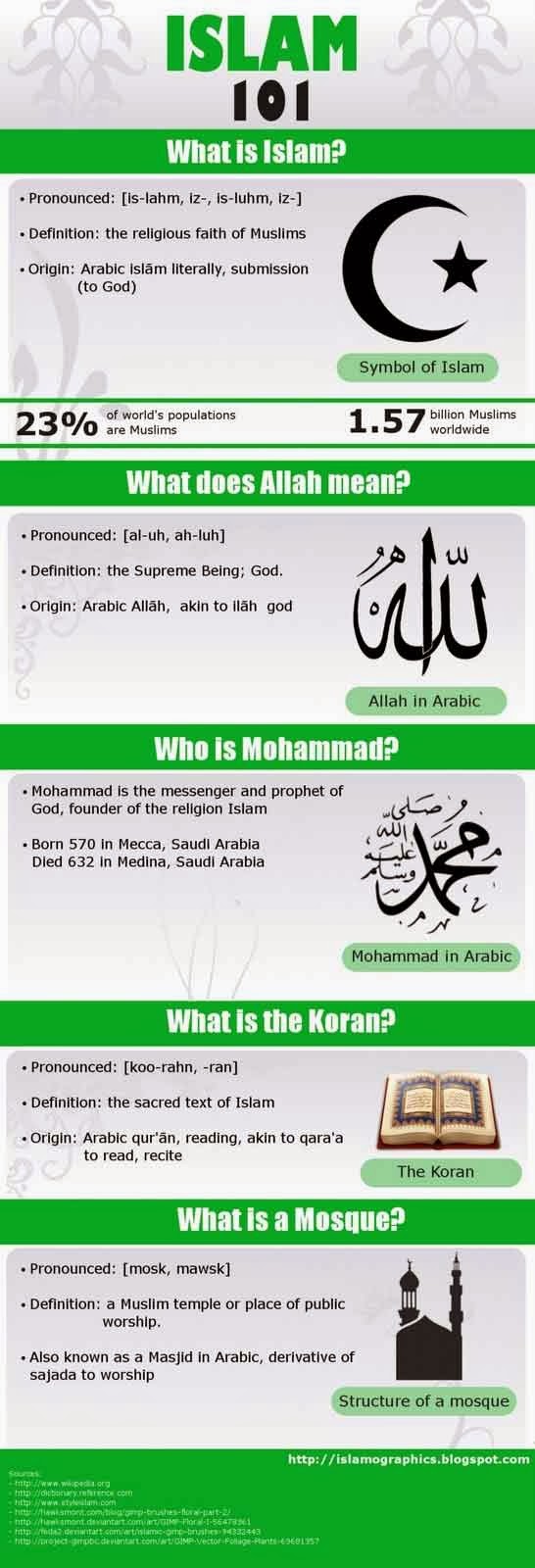Islam 101 - What Is Islam?
Islam 101 - What Is Islam?
Di Posting Oleh : Admin
Kategori : Blog Tutorial, Teknologi dan Kesehatan: Mangaip Blog | Berita Terkini dan Terbaru: Terbaru.co.id
Definition: the religious faith of muslims
origin: Arabaic Islam literally, submission (to Allah)
Origin: arabic Allah, akin to ilah god.
He Born 570 in Mecca, Saudi Arabia, Died 632 in Medina, Saudi Arabia.
Origin: Arabic Qur'an, reading, akin to qara`a to read, recite.
Also known as a Masjid in Arabic, derivative of sajada to worship.
The five pillars of Islam are the fundamental duties in a Muslims life, which lead to living a good and responsible life according to Islam.
Di Posting Oleh : Admin
Kategori : Blog Tutorial, Teknologi dan Kesehatan: Mangaip Blog | Berita Terkini dan Terbaru: Terbaru.co.id
What is Islam?
Pronounced: [is-lahm, iz-, is-luhm, iz-]Definition: the religious faith of muslims
origin: Arabaic Islam literally, submission (to Allah)
What Does Allah mean?
Definition: the supreme Being; God.Origin: arabic Allah, akin to ilah god.
Who is Muhammad?
Muhammad is the messenger and prophet of Allah, founder of the religon Islam.He Born 570 in Mecca, Saudi Arabia, Died 632 in Medina, Saudi Arabia.
What is the Quran?
Quran is the sacred text of IslamOrigin: Arabic Qur'an, reading, akin to qara`a to read, recite.
What is a Mosque?
Mosque is muslim place of public worshipAlso known as a Masjid in Arabic, derivative of sajada to worship.
What is Iman?
Iman is of Arabic origin. It means faith or belief. It comes from the word amana which means to believe.5 Pillars Of Islam
the religion of Islam Requires accepting some main Articles of Faith. These are the core beliefs - without any one of these, one wolud not be accepted as a beleiver. The acceptance of these Articles leads to the practical five Pillars of Islam.The five pillars of Islam are the fundamental duties in a Muslims life, which lead to living a good and responsible life according to Islam.
6 Pillars of Iman
Iman is of Arabic origin. It means faith or belief. It comes from the word amana which means to believe.1) To believe in Allah
This means that you believe that Allah exists, and that He is One in His Essence, His Attributes, and His Actions. He has no partner or associate sharing with Him the right to be worshipped. To Him is every quality of perfection that is befitting of His exalted Being, and it is impossible for any deficiency to be attributed to Him.
2) To believe in His angels
This is the acceptance and compliance of the heart that the angles are the noble servants of Allah, they do as He commands and never disobey. They are beings created from light, neither male nor female. They do not have father, mothers, mates, or children. Their sustenance is the remembrance and glorification of Allah. They act without restriction in the creation according to what Allah has permitted for them.
3) To believe in His books
This is to believe that the Books of Allah are His Non-created Speech, and that they are sanctified above being comprised of letters and sounds and that everything that they contain is real and true. There are four books in particular we must know: 1.)The Tawrah given to Musa (AS), 2) The Zabur given to Dawud (AS)
3) The Injeel given to 'Isa (AS), 4) and the Furqan (the Qur'an) given to Muhammad (SAW
3) The Injeel given to 'Isa (AS), 4) and the Furqan (the Qur'an) given to Muhammad (SAW
4) To believe in His messengers
Belief in the messengers means to believe that Allah sent them to the creation as a guidance, in order that they would teach them how to perfect their lives in this world and the Hereafter. He aided them with miraculous occurrences that proved their truthfulness. They delivered the message Allah revealed to them. It is obligatory to show respect and courtesy to all of them, and to not distinguish between them (i.e. saying, "we believe in this one, but we reject this other one.") They are all under Allah's Divine protection from sins great and small. It has been said that the number of messenger is 313, and from among them we are required to know 25: 1) Adam 2) Idrees 3) Nuh 4) Hud 5) Saalih 6) Ibraaheem 7) Lut 8) Ismaa'eel 9) Ishaaq 10) Ya'qub 11) Yusuf 12) Ayyub 13) Shu'ayb 14) Musa 15) Haarun 16) Alyasaa' 17) Dawud 18) Sulaymaan 19) Ilyaas 20) Yunus 21) Zakariyyah 22) Yahya 23) 'Uzayr 24) 'Isa 25) Muhammad
5) To believe in the Day of Judgement
This means to believe that it is real and true, and to believe in everything it is comprised of such as the scale, the bridge over the hell-fire leading into Paradise, the Paradise, and the Hell-Fire. One must also believe in the questioning of the dead by the two angels, the punishment/felicity in the grave, and other things from the matters of the world between death and the Last Day (this world is called al-Barzakh).
6) To believe in the Divine Destiny and that the good and bad of it are all from Allah.
To believe that nothing happens or occurs except that which Allah has determined, and that it is impossible for anything to happen or occur without Allah having determined it. All good and bad was determined before the existence of creation. Read more about 6 Pillars of Faith at here
The essence of Taqwa is to make a shield (which guards) against Allah's anger and punishment. That shield is to obey His commandments and abstain from His punishment. Read more About Taqwa...
What Is Taqwa?
Linguistically Taqwa means forbearance, fear and abstinence, but in the Islamic terminology, Taqwa has a distinct meaning. Taqwa is a high state of heart, which keeps one conscious of Allah's presence and His Knowledge, and it motivates him to perform righteous deeds and avoid those, which are forbidden.The essence of Taqwa is to make a shield (which guards) against Allah's anger and punishment. That shield is to obey His commandments and abstain from His punishment. Read more About Taqwa...




Komentar
Posting Komentar